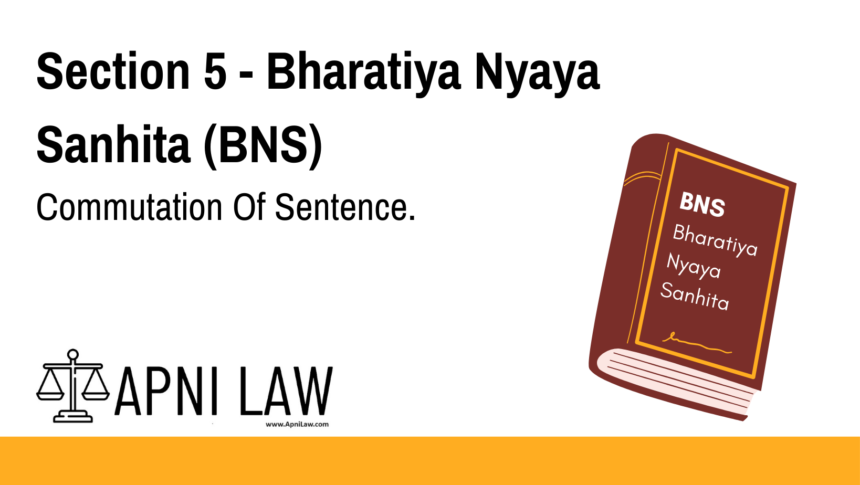Code: Section 5 BNS
Section 5 – Commutation of Sentence
The appropriate Government may, without the consent of the offender, commute any punishment under this Sanhita to any other punishment in accordance with section 474 of the Bharatiya Nagarik Suraksha Sanhita, 2023.
Explanation:
For the purposes of this section, the expression “appropriate Government” means:
(a) in cases where the sentence is a sentence of death or is for an offence
against any law relating to a matter to which the executive power of the Union extends,
the Central Government; and
(b) in cases where the sentence (whether of death or not) is for an offence
against any law relating to a matter to which the executive power of the State extends,
the Government of the State within which the offender is sentenced.
Explanation of Section 5 BNS
What is Commutation of Sentence?
Commutation refers to reducing the severity of a punishment without removing the conviction itself. For example, a death penalty may be reduced to life imprisonment, or a rigorous imprisonment sentence may be changed to simple imprisonment.
Who Has the Power to Commute a Sentence?
- Central Government:
- When the punishment is death penalty.
- When the offence falls under Union jurisdiction, such as crimes related to terrorism, sedition, or national security.
- State Government:
- When the offence is under state jurisdiction, such as murder, theft, or rioting.
- When the convict is serving a sentence under a state law.
Difference Between Commutation, Remission, and Pardon
- Commutation: Reduces the punishment to a lesser sentence. Example: Death penalty → Life imprisonment.
- Remission: Reduces the duration of a sentence but does not change its nature. Example: 10 years imprisonment → 7 years imprisonment.
- Pardon: Completely removes both the conviction and the sentence. The person is treated as if they never committed the offence.
Illustration of Section 5 BNS
Example Cases
✔️ Death Penalty Commuted to Life Imprisonment
A is sentenced to death for murder. However, the President of India, on the advice of the Central Government, commutes the sentence to life imprisonment after reviewing the case.
✔️ Life Imprisonment Commuted to Rigorous Imprisonment
B is sentenced to life imprisonment for an offence under state jurisdiction. The State Government commutes the sentence to 20 years of rigorous imprisonment due to the convict’s good behavior in jail.
✔️ Rigorous Imprisonment Commuted to Simple Imprisonment
C is sentenced to 10 years of rigorous imprisonment for an offence. Due to severe health issues, the State Government changes it to simple imprisonment to accommodate medical needs.
Common Questions on Section 5 BNS
1. What is the purpose of commutation under Section 5 BNS?
Commutation is a legal provision that reduces the severity of a sentence based on humanitarian grounds, good behavior, or other special circumstances.
2. Can a sentence be commuted without the convict’s consent?
Yes, under Section 5 BNS, the government has full authority to commute a sentence without requiring the offender’s consent.
3. Does commutation erase the conviction?
No, commutation only modifies the punishment. The conviction remains on record.
4. Who has the authority to commute a sentence?
- The Central Government in cases of death sentences or Union-related crimes.
- The State Government in cases of state-level offences.
5. What is the difference between commutation and pardon?
- Commutation: Changes punishment to a lesser sentence, but the conviction remains.
- Pardon: Completely erases both the punishment and the conviction, treating the person as if they never committed the crime.
Conclusion
Section 5 of the Bharatiya Nyaya Sanhita (BNS) grants the Central and State Governments the power to commute sentences in accordance with Section 474 of Bharatiya Nagarik Suraksha Sanhita (BNSS), 2023. This legal provision ensures that punishment can be adjusted in special cases, such as those involving mercy petitions, good conduct, or exceptional circumstances.
By balancing strict punishment with fairness, commutation allows for reform and rehabilitation, ensuring that justice is served while considering humanitarian aspects.
🔗 Read more about related sections:
- Section 5 BNS – Commutation of Sentence
- Section 474 BNSS – Commutation, Remission & Suspension
- Full BNS Bare Act
For detailed legal insights, visit ApniLaw.com – Your Trusted Legal Guide! 🚀








